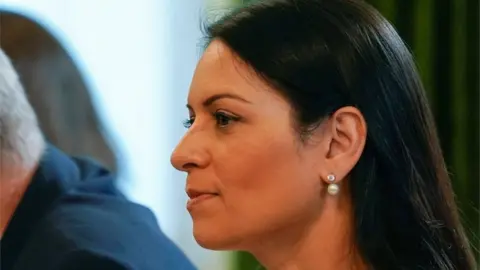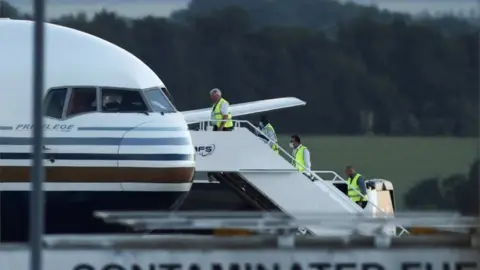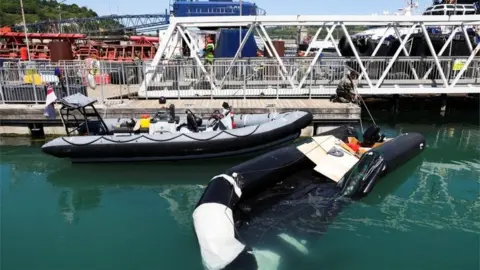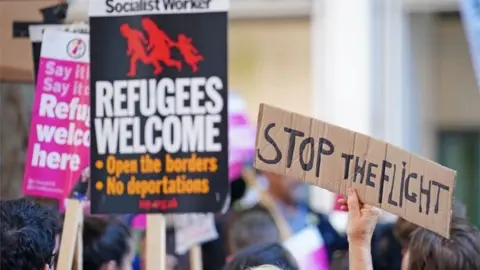Rwanda asylum flight: Where does legal setback leave ministers?
 Reuters
ReutersFor more than 20 years, successive governments have wrestled, often with limited success, with what to do about people who reach the northern coast of France, dreaming of a future in the UK.
From clinging to lorries, to perilous crossings in small boats, home secretaries from David Blunkett to Priti Patel have cast around for solutions.
The magnetism for many of Britain hasn't diminished; in fact the opposite; there's been an exponential rise in small boat crossings in recent years.
The Rwanda policy comes at considerable cost; £120m as an upfront payment to Kigali, for a start, and while ministers say the number of people who might be sent there is "uncapped", it's thought it may number just hundreds per year.
It so far numbers zero - after confirmation just 20 minutes or so before the first flight was due to leave that all those asylum seekers due to be on it had obtained legal injunctions that granted them a reprieve.
The irritation from those in government is palpable and they are determined to press ahead with their plans.
They make the case that there is a moral compulsion to act, given the risks those crossing the Channel are subjecting themselves to and the costs are spiralling as the number of arrivals spiral too.
So, they conclude, a deterrent with shock value is deemed necessary.
Let's talk about two things: the law and public opinion.
While plenty of those possessed of titles and opinions, and platforms from which to articulate them, have expressed their outrage, from archbishops to lawyers and, privately, at least it would seem - the heir to the throne - public opinion is considerably more nuanced.
It brings me back to a point I've made before: noisy people in politics attract attention. Quieter people, rather less of it.
So people with big job titles and bigger opinions command headlines, but let's look a little deeper.
 Reuters
ReutersPolling suggests, yes, it's a divisive idea - there is no doubt many are repulsed by it - but an overwhelming majority had previously been critical of the lack of a government plan.
You might remember last November at least 27 people died in the Channel trying to cross to reach England.
Shortly after, according to a poll by Savanta Comres, just one in five thought the Home Secretary Priti Patel was handling the issue well, rising to three in 10 Conservative voters.
Figures in government tell me those working on the issue increasingly felt the situation was unsustainable, that something new and different and bold was now necessary.
When the Rwanda policy was announced, a poll immediately afterwards, again by Savanta, found that just under half of the public supported it, compared with 26% who opposed it.
Ten days later, the same polling company found support had slipped a bit, to 41%, while 28% were against it.
 Reuters
ReutersThe very act of trying to do something appeared valued by many people, even if some thought the idea had problems.
You can read an interesting analysis of the numbers from Savanta Comres's political research director here.
By Monday, a poll by YouGov suggested 44% of people supported the plan, 40% were opposed, which implies that scrutiny of the policy might be chipping away at its popularity, but more people approve of it than reject it.
It is also worth pointing out that there appears to be considerably more support for the policy among Conservative supporters, according to YouGov (74%) than there is among those who support other political parties (among Labour supporters it's 19%, it's 26% of Liberal Democrat backers).
I was chatting to a senior Conservative MP earlier, who acknowledged when they first heard about the Rwanda scheme they gulped - but had concluded a drastic measure was necessary to smash the business model of the people smugglers and put people off getting into rickety boats.
It remains an open discussion whether this policy can do that and at what cost. It might fail. Let's be frank: the early evidence doesn't bode well for the government.
Let's see where the grounding this first flight leaves people's views.
 PA Media
PA MediaLabour argue it not only abandons what they call "British values of common sense and decency" but claim it will prove to be "unworkable, unethical, extortionately expensive and risks making smuggling and trafficking worse".
But ministers are absolutely determined to make it work.
The prime minister has said he would be willing to change the law to make delivering the policy easier.
And this is where having a look at the Conservative manifesto from the last general election is instructive.
On page 48, there is a commitment to "update the Human Rights Act."
That is a bit of law now 24 years old, which Conservatives feel gold plates the European Convention on Human Rights, the very thing that has led to some asylum seekers being offloaded from the flight to Kigali.
"It is very surprising that the European Court of Human Rights has intervened despite repeated earlier success in our domestic courts," the Home Secretary Priti Patel said.
We can expect to hear soon from the government about its wider plans on the Human Rights Act, plans the Tories described in their manifesto as ones that would mean legal interventions are "not abused to conduct politics by another means or to create needless delays".
Those were words written three years ago, but appear very topical right now.
